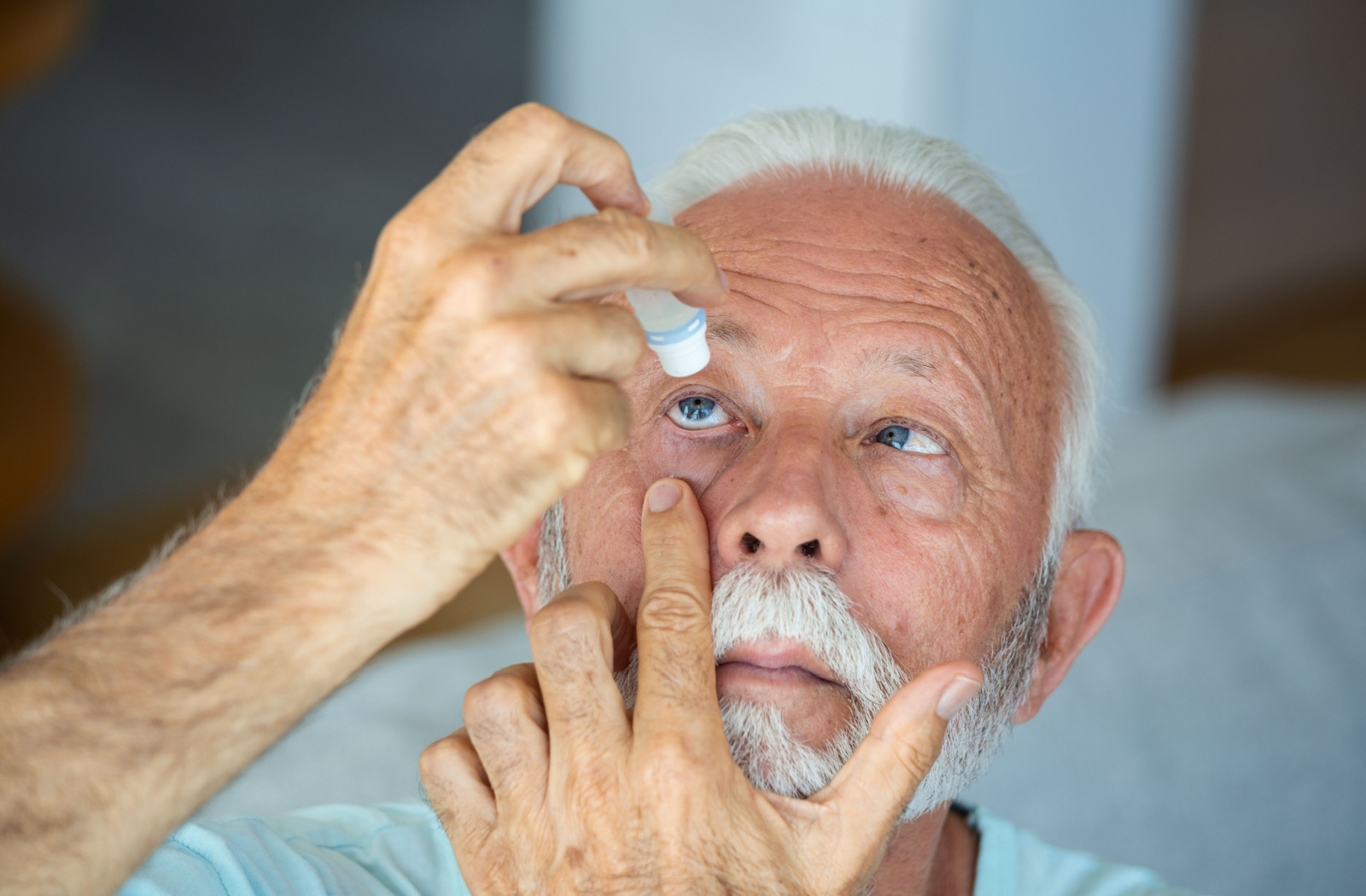Dry eyes are more than an inconvenience—they can impact your vision and quality of life. Dry eyes can cause several symptoms, including blurry vision, redness, light sensitivity, and stinging sensations.
Fortunately, you’re not alone in experiencing blurry vision and uncomfortable dryness. Your optometrist can recommend a treatment plan to relieve your dry eye symptoms, but there are proactive measures you can take on your own time.
What Causes Dry Eyes?
Dry eye generally occurs when the eyes don’t produce enough or the right kind of tears. These tears are needed to maintain your eye health and provide clear vision. It’s a common (and often chronic) vision issue, especially in older adults.
The most common cause of dry eye disease is meibomian gland dysfunction (MGD), which results from the oil glands in the eyelids not working correctly, and blepharitis, which is an eyelid inflammation caused by bacteria or some skin conditions. An optometrist can diagnose these conditions.
However, many environmental conditions can make these dry eye symptoms worse, including:
- Dry or smoky air
- Windy conditions
- Prolonged screen time
Dry eyes can also be a side effect of antihistamines, antidepressants, blood pressure medicines, or certain medical conditions such as diabetes and rheumatoid arthritis. Additionally, hormonal changes during menopause or the simple act of aging can sometimes contribute to a decrease in tear production and dry eyes.
What Causes Blurry Vision?
Blurry vision can stem from various underlying factors closely linked to dry eyes. When the eyes lack sufficient moisture, the surface cannot clearly reflect light, resulting in distorted or hazy images.
Refractive errors, such as myopia (nearsightedness), hyperopia (farsightedness), and astigmatism, can contribute to blurry vision. The shape of the eye prevents light from focusing correctly on the retina.
Other potential causes include cataracts, which cloud the eye’s lens, and macular degeneration, which affects the central vision.
What Does It Mean If You Have Dry Eyes & Blurred Vision At The Same Time?
Tear Film Instability
Your tear film comprises three layers: oil, water, and mucus. Each layer plays a vital role in keeping your eyes moist and clear. When the tear film is unstable, it can lead to dryness and blurry vision. The lack of moisture affects the smoothness of the corneal surface, causing light to scatter and blur your vision.
Inflammation
Inflammation of the eye surface or tear glands can disrupt tear production and lead to dry eyes. This inflammation can also affect the clarity of your vision, making it blurry.
The Vicious Cycle
Dry eyes can lead to rubbing your eyes, which further irritates them and exacerbates both dryness and blurriness. This creates a vicious cycle where one condition worsens the other, making it crucial to address both issues simultaneously.
When To See an Eye Care Specialist
Most often, blurred vision is just a symptom of dry eye. However, it can also mean that another health condition is present. Contact your optometrist for treatment if, in conjunction with dry eyes and blurred vision, you experience:
- Frequent headaches
- Tears that you cannot control
- Yellow or green discharge from your eye (a sign of infection)
- Consistent difficulty seeing either up close or at a distance
Treating Dry Eyes & Blurriness
Combating dry eyes and blurry vision involves a multi-faceted approach. Depending on the root cause of your dry eyes, your optometrist will recommend different treatments to relieve your symptoms.

Over-the-Counter Solutions
Artificial tears and lubricating eye drops are readily available and can immediately relieve dry eyes. Look for preservative-free options to avoid further irritation. You can also try using a warm eye compress, lid wipes, and adding omega-3 fatty acids to your diet.
Make sure your prescription for glasses or contact lenses is up-to-date for blurriness.
Prescription Treatments
If over-the-counter solutions aren’t enough, your eye doctor can prescribe medications like cyclosporine (Restasis) or lifitegrast (Xiidra), which help increase tear production. For blurriness caused by underlying conditions, your doctor may recommend specific treatments tailored to your needs.
Preventing Dry Eyes & Blurred Vision
Prevention is always better than cure. Here are some tips to support healthy tear production and care for your eye health.
- Maintain a healthy diet of omega-3 fatty acids, zinc, and vitamins A, C, and E to improve tear quality and reduce inflammation. Salmon, flaxseeds, and walnuts are excellent sources.
- Practice good eye hygiene by regularly removing debris or makeup that could clog your tear ducts. Use a gentle cleanser, and avoid rubbing your eyes.
- Keep regular eye exams to help detect issues early before they become severe.
By adopting a comprehensive approach that includes over-the-counter solutions, prescription treatments, and lifestyle changes, you can effectively manage and prevent dry eyes and blurry vision.
Northern Lights Optometry understands how minor symptoms can create major anxiety about your eye health. Contact us today to book your next appointment and stay on top of your eye health.





